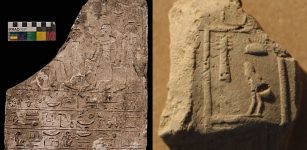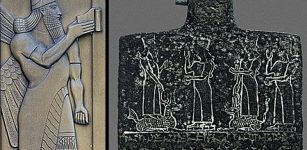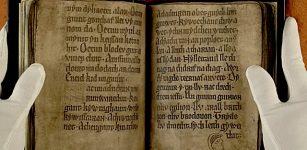What Were The Most Important Medieval Marketplace Rules?
Conny Waters - AncientPages.com - Visiting a marketplace in the Middle Ages could be a pleasant experience. However, honesty was crucial because practices such as fraud and theft were subject to harsh punishment.
In Medieval England marketplaces England, markets typically took place weekly.
Credit: Adobe Stock - lutjo1953
These marketplaces were excellent opportunities for buying and selling goods and also functioned as social hubs where people could interact with each other.
Medieval Practices Of Cutting Coins In Pieces
It was common knowledge there were special trading rules which everyone had to follow.
"Coin was increasingly important in the growing market economy of late medieval England and to ensure confidence in this medium of exchange the sovereign attempted to exert control." 1
Cheating with gold, silver or producing falsified coins were serious crimes. "In the tenth century, Aethelstan (929–39) was the first to declare that there should be one coinage in his realm and that money should be minted only in the towns ascribed. The penalty for base moneyers who produced light coins was for them to have their hand cut off and displayed on the mint." 1
In the past, small traders did not necessarily require a whole coin for their transactions. Instead, coins were often divided into smaller segments, which were then utilized for several payments, diminishing their practical value.
Everyone Could Be Punished
All cheaters, whether male or female, were punished. In England, moneylenders who imposed exorbitantly high-interest rates were subjected to public humiliation. They were bound to a chair and paraded around the market town. The mode of transportation used for this purpose was typically an open wagon, commonly utilized for carrying manure.
In Italian towns with narrow streets and little space, it was forbidden to throw meat on the ground.
In Florence, the butchers maintained cleanliness in their selling areas, ensuring no rotten remains were left behind. However, due to the value of meat scraps and other waste materials, cities would auction the cleaning rights of these squares. The highest bidder would then collect these waste materials for resale.
The success of a market also heavily depended on whether local authorities could enforce law and order. For instance, in Leicester, England, individuals who caused disturbances by drawing their swords within the market's vicinity faced stricter penalties than usual. In other places, visitors were prohibited from bringing weapons through city gates to maintain peace and order.
Illegal Marketplaces
"Some of these rural markets were associated with churches. In 1488, illegal markets held at the Cistercian nunnery of Skokloster and at a church called Ness were ordered to close. Christian churches that had replaced pagan cult centres continued to provide opportunities for buying and selling, although there is little direct evidence of Sunday trading in Scandinavia as there is in England.
Swedish market charters beginning in the late thirteenth century are concerned only with weekday markets (Ku/turhistorisk Leksikon, xviii, col. 480), but the thirteenth century law of Gotland provided for the sale on Sundays of cheese, butter, fish, fowls and meat, but not four, seeds or other goods. In1531 Gustav Vasa complained that illegal fairs were becoming so frequent that there would soon be one held at every church festival." 1
Price Controls
There were limits on how much a Medieval seller could demand for a product. To manage price fluctuations on basic products, a price cap was implemented on items like bread, wine, and beer.
Medieval market. Credit: Public Domain
The price ceiling would ensure that even the lowest classes of society could afford food, thus preventing rebellion. "Maximum prices of meat were occasionally set in a number of individual boroughs, perhaps drawing on statutory precedent, and showed how local price-fixing was sometimes tolerated." 1
In England, the pricing of essential products was determined by the King. He appointed two price controllers in every city throughout the kingdom. Their responsibility was to monitor marketplaces for fraudulent activities. If they discovered anyone attempting to charge more than the permitted price, punitive measures, including fines, were taken.
In the medieval marketplace, the rules were universal, applying to both sellers and buyers alike.
Written by Conny Waters – AncientPages.com Staff Writer
Copyright © AncientPages.com All rights reserved. This material may not be published, broadcast, rewritten or redistributed in whole or part without the express written permission of AncientPages.com
Expand for references- James Davis - Medieval Market Morality: Life, Law and Ethics in the English Marketplace, 1200–1500
- Tim Pestell, Katharina Ulmschneider - Markets in Early Medieval Europe: Trading and 'Productive' Sites, 650-850
- Dennis Romano - Markets and Marketplaces in Medieval Italy, C. 1100 to C. 1440
More From Ancient Pages
-
 Story Behind A Huge Mysterious Ancient Rock Art Site In Central Queensland Revealed By Scientists
Archaeology | Sep 21, 2022
Story Behind A Huge Mysterious Ancient Rock Art Site In Central Queensland Revealed By Scientists
Archaeology | Sep 21, 2022 -
 Aethelflaed – ‘Iron Lady Of Mercia’ Was A Brave Female Warrior Who Led Forces Against Danish Vikings
Featured Stories | Aug 2, 2019
Aethelflaed – ‘Iron Lady Of Mercia’ Was A Brave Female Warrior Who Led Forces Against Danish Vikings
Featured Stories | Aug 2, 2019 -
 Who Was King Menes? Mystery Of This Legendary Ruler May Go Back 20,000 Years
Civilizations | May 1, 2017
Who Was King Menes? Mystery Of This Legendary Ruler May Go Back 20,000 Years
Civilizations | May 1, 2017 -
 Ancient Egyptian Papyrus Tells A Different Story About Biblical Isaac’s Fate
Archaeology | May 1, 2018
Ancient Egyptian Papyrus Tells A Different Story About Biblical Isaac’s Fate
Archaeology | May 1, 2018 -
 Tiny Paper Scraps From ‘Queen Anne’s Revenge’ Shed Light On Reading Habits Of Blackbeard’s Pirates
Archaeology | Jan 7, 2018
Tiny Paper Scraps From ‘Queen Anne’s Revenge’ Shed Light On Reading Habits Of Blackbeard’s Pirates
Archaeology | Jan 7, 2018 -
 Ancient Cotton Fibers Dating Back 7,000 Years Discovered In NE Israel
Archaeology | Dec 19, 2022
Ancient Cotton Fibers Dating Back 7,000 Years Discovered In NE Israel
Archaeology | Dec 19, 2022 -
 Pyrgi Gold Tablets: A Rare Ancient Bilingual Treasure
Artifacts | Nov 23, 2018
Pyrgi Gold Tablets: A Rare Ancient Bilingual Treasure
Artifacts | Nov 23, 2018 -
 Why Did Ancient Egyptians Fear The Vizier?
Ancient History Facts | May 24, 2018
Why Did Ancient Egyptians Fear The Vizier?
Ancient History Facts | May 24, 2018 -
 Ancient Mystery Of America’s Missing Metal – Can The Answer Be Found In Ancient Europe?
Civilizations | May 18, 2018
Ancient Mystery Of America’s Missing Metal – Can The Answer Be Found In Ancient Europe?
Civilizations | May 18, 2018 -
 Unexplained Teleportation Cases Of People – Dangerous Fog – Part 2
Featured Stories | Oct 2, 2019
Unexplained Teleportation Cases Of People – Dangerous Fog – Part 2
Featured Stories | Oct 2, 2019 -
 Mystery Of The Faceless Creature – Ancient And Modern Sightings
Featured Stories | Jun 19, 2018
Mystery Of The Faceless Creature – Ancient And Modern Sightings
Featured Stories | Jun 19, 2018 -
 Important Discoveries Made In Upper Egypt’s Tel Edfu and Kom Ombo Sites
Archaeology | Jan 15, 2018
Important Discoveries Made In Upper Egypt’s Tel Edfu and Kom Ombo Sites
Archaeology | Jan 15, 2018 -
 Secrets Of Lake Huron – Mysterious Disappearance Of Long-Lost Steamship Solved
Archaeology | Nov 3, 2023
Secrets Of Lake Huron – Mysterious Disappearance Of Long-Lost Steamship Solved
Archaeology | Nov 3, 2023 -
 Mesopotamian God Nabu Inscribed The Human Fates Determined By The Gods
Featured Stories | Aug 7, 2018
Mesopotamian God Nabu Inscribed The Human Fates Determined By The Gods
Featured Stories | Aug 7, 2018 -
 13th Century Black Book Of Carmarthen: Erased Poetry And Ghostly Faces Revealed By UV Light
Artifacts | Apr 4, 2015
13th Century Black Book Of Carmarthen: Erased Poetry And Ghostly Faces Revealed By UV Light
Artifacts | Apr 4, 2015 -
 Supay: God Of Death And Underworld And Ruler Over Race Of Demons According To Inca Beliefs
Featured Stories | Jun 7, 2020
Supay: God Of Death And Underworld And Ruler Over Race Of Demons According To Inca Beliefs
Featured Stories | Jun 7, 2020 -
 Ancient DNA Reveals The Earliest Evidence Of The Last Massive Human Migration To Western Europe
DNA | Jul 24, 2023
Ancient DNA Reveals The Earliest Evidence Of The Last Massive Human Migration To Western Europe
DNA | Jul 24, 2023 -
 Kingdom Of The Vandals: A People In Search Of A Home
Civilizations | Dec 14, 2018
Kingdom Of The Vandals: A People In Search Of A Home
Civilizations | Dec 14, 2018 -
 Boobrie: Shape-Shifting Mythical Horror Bird From Scottish Highlands
Featured Stories | Feb 9, 2017
Boobrie: Shape-Shifting Mythical Horror Bird From Scottish Highlands
Featured Stories | Feb 9, 2017 -
 History Shows: Taxes And Bureaucracy Are Cornerstones Of Democracy
Archaeology | Feb 18, 2021
History Shows: Taxes And Bureaucracy Are Cornerstones Of Democracy
Archaeology | Feb 18, 2021


